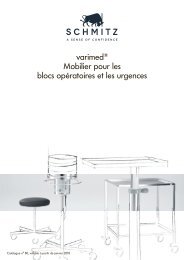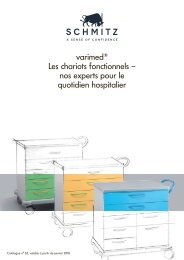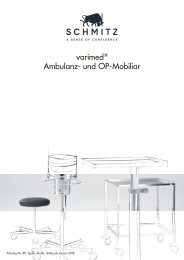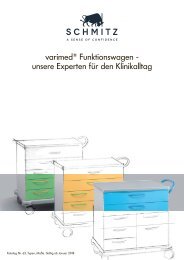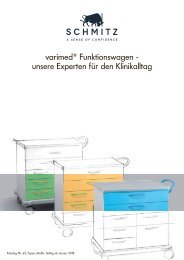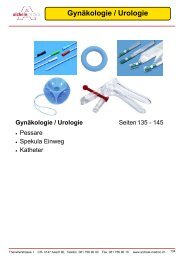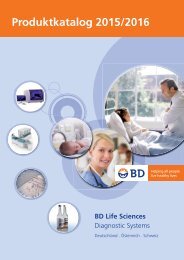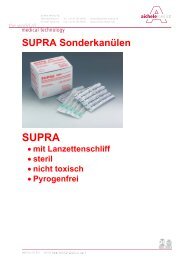BD Diagnostics EN
You also want an ePaper? Increase the reach of your titles
YUMPU automatically turns print PDFs into web optimized ePapers that Google loves.
<strong>BD</strong> Phoenix ID Only Panels<br />
Cat. Nº. SIZE DESCRIPTION<br />
448007 25 panels <strong>BD</strong> Phoenix - Gram Negative ID Panel<br />
The <strong>BD</strong> Phoenix Gram Negative ID panel is used for the identification of<br />
Gram-negative bacteria. The panel consists of 51 wells, 46 of which are<br />
filled with dried biochemical substrates and 2 wells with reaction controls.<br />
No off-line tests or reagent additions are required for the identification. The<br />
<strong>BD</strong> Phoenix system is able to identify approximately 160 Gram-negative<br />
strains of clinically relevant bacteria. 25 panels and panel closures are<br />
included in each package.<br />
448008 25 panels <strong>BD</strong> Phoenix - Gram Positive ID Panel<br />
The <strong>BD</strong> Phoenix Gram Positive ID panel is used for the identification of<br />
Gram-positive bacteria. The panel consists of 51 wells, 46 of which are filled<br />
with dried biochemical substrates and 2 wells with reaction controls. No<br />
off-line tests or reagent additions are required for the identification. The <strong>BD</strong><br />
Phoenix system is able to identify approximately 145 Gram-positive strains<br />
of clinically relevant bacteria. 25 panels and panel closures are included in<br />
each package.<br />
448316 25 panels <strong>BD</strong> Phoenix - Yeast ID Panel<br />
<strong>BD</strong> Phoenix AST Only Panels<br />
Cat. Nº. SIZE DESCRIPTION<br />
The <strong>BD</strong> Phoenix Yeast ID panel is used for the identification of Yeast and<br />
Yeast-like organisms. The panel consists of 51 wells, 46 of which are filled<br />
with dried biochemical substrates and 2 wells with reaction controls. No<br />
off-line tests or reagent additions are required for the identification. The<br />
Phoenix system is able to identify approximately 64 clinically relevant Yeast<br />
and Yeast-like strains. The Yeast ID panels must be inoculated using a 2.00<br />
- 2.40 McFarland inoculum density, such inoculum density shall be prepared<br />
using the <strong>BD</strong> PhoenixSpec Calibration Standard kit (Cat. No. 441951) and<br />
the <strong>BD</strong> PhoenixSpec Nephelometer.<br />
448292 25 panels <strong>BD</strong> Phoenix Gram Positive AST Only Panel (PMIC-79)<br />
CLSI Standard.<br />
List of Antimicrobials (μg/ml): AM 2 - 8, CZ 2 - 16, FOX 2 - 8, CIP 0.5 - 2,<br />
CC 0.5 - 2, DAP 0.5 - 4, E 0.25 - 8, FA 1 - 8, GM 2 - 8, GMS 500, ECC,<br />
LVX 0.5 - 2, LZD 1 - 4, MXF 0.25 - 1, MUP 256, FM 16 - 64, OX 0.25 - 2, P<br />
0.0625 - 8, RA 0.5 - 2, TEC 1 - 16, TE 0.5 - 8, SXT 1/19 - 4/76, VA 0.5 - 16<br />
448294 25 panels <strong>BD</strong> Phoenix Gram Negative AST Only Panel (NMIC-99)<br />
CLSI Standard.<br />
List of Antimicrobials (μg/ml): AN 8 - 32, AMC 4/2 - 16/8, SAM 4/2 - 16/8,<br />
ATM 2 - 16, CZ 2 - 8, FEP 1 - 16, SCP 0.5/8 - 32/8, FOX 4 - 16, CAZ 1 - 16,<br />
CIP 0.5 - 2, CL 1 - 4, ETP 0.25 - 1, GM 2 - 8, IPM 0.5 - 8, LVX 1 - 4, MEM<br />
0.5 - 8, TZP 4/4 - 64/4, TIM 8/2 - 128/2. TGC 1 - 4, SXT 1/19 - 4/76, CCX<br />



